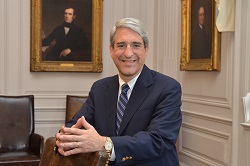
Our Earth Day Responsibility
April 17, 2017
This weekend Yale will join communities around the world in observing Earth Day. Yale was one of the many campuses that celebrated the very first Earth Day in 1970—originally billed as a “national teach-in” on the environment. In the years since, Earth Day has helped transform the national conversation about the environment, reminding us of our responsibilities towards our air, water, and land—with lasting consequence for generations of Americans and people around the world.
Earth Day remains an opportunity for learning, understanding, and action. Here at Yale, we are addressing the nine sustainability goals articulated in the Yale Sustainability Plan 2025. The Yale Institute for Biospheric Studies recently offered funding to support research by individuals or teams of students who have innovative ideas for sustainability projects. Over 100 students, faculty, and staff are also working to develop sustainability action plans tailored to their academic disciplines or roles on campus.
We are working with the City of New Haven and our alumni to start a broader dialogue that extends beyond our campus. In October, the Hixon Center for Urban Ecology at the Yale School of Forestry & Environmental Studies will co-host its annual conference with the City of New Haven. Alumni will return to campus in November to join renowned global experts, students, and faculty for the second Yale Environmental Sustainability Summit, an event focused on the connections between sustainability, social justice, economic development, and global equality.
Scholarship and research are at the heart of Yale’s approach to environmental issues. As the first university to pilot a carbon charge program and the first university member of the Carbon Pricing Leadership Coalition, Yale is serving as a “living laboratory” for carbon pricing—a market-based approach to reducing emissions that charges those who emit carbon dioxide. In July, we will implement a carbon charge, based on recommendations from the Yale Carbon Charge Presidential Task Force and Steering Committee, which will cover over 70% of Yale building emissions. Our commitment to applied research continues as we work to make our transportation systems more sustainable. The Yale Fleet was recognized recently for its sustainability and efficiency efforts, and the university received two statewide transportation awards.
Yale’s great strength—our vital contribution to environmental efforts—is the knowledge, understanding, and leadership necessary to tackle our most pressing global challenges, including climate change and environmental degradation. At the School of Forestry & Environmental Studies and in laboratories and classrooms across campus, students and faculty are working to create new knowledge and develop creative approaches to addressing environmental issues.
Please join me and many others at Yale as we do our part to fulfill our responsibilities to this planet and its people. As Gifford Pinchot (B.A. 1889, LL.D. 1925), the first chief of the U.S. Forest Service and a founder and major benefactor of the Yale School of Forestry, wrote, “The vast possibilities of our great future will become realities only if we make ourselves responsible for that future.”